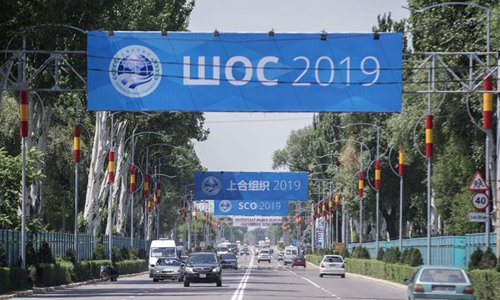HOME >> OPINION,SPECIAL-COVERAGE
Head-of-state diplomacy deepens trust between China and Central Asian countries
By Yang Jin Source:Global Times Published: 2019/6/12 19:33:41

File Image: Xinhua
Chinese President Xi Jinping is on a state visit to Kyrgyzstan from Wednesday to Friday and will subsequently visit Tajikistan from June 14 to 16.This will be Xi's second visit to the two Central Asian nations after his trip to Kyrgyzstan in 2013 and Tajikistan in 2014. The visits are expected to further promote China's "comprehensive strategic partnership" with both nations and will help draw new plans for future bilateral relations.
China has achieved a high-level of political trust with Kyrgyzstan and Tajikistan.
In the sphere of economy and trade, China has become an important partner of the two states. The second largest economy of the world has become the top trading partner and foreign investment source of Kyrgyzstan; it is also the largest source of investment and third largest trading partner of Tajikistan. Beijing's cooperation with the two nations under the China-proposed Belt and Road Initiative (BRI) has borne fruit.
In the domain of security, China has cooperated with the two nations in fighting terrorism, separatism and extremism. Ties with Kyrgyzstan and Tajikistan are important part of China's neighborhood diplomacy. The security of China's western regions is closely related to stable bilateral relations with neighboring countries such as Kyrgyzstan and Tajikistan.
Furthermore, culture exchanges with the two countries have intensified, Confucius Institutes opened and student exchanges stepped up.
In general, China's cooperation with Kyrgyzstan and Tajikistan is comprehensive and growing.
Xi's visit will further enhance ties and push them to a new level. Tajikistan and Kyrgyzstan are among the first participants of the BRI after it was proposed in 2013.
As part of the initiative, they have seen good results and still have high expectations from it. Constructions of a tunnel under the Shar-Shar Pass on the road between Dushanbe and Kuljab in Tajikistan, and a power plant in Kyrgyz capital Bishkek, are two leading examples of China's cooperation with the two states within the BRI framework.
Both nations are promoting further alignment of the BRI with their own national development strategy and tapping the potential to cooperate with China within the framework of the BRI.
China has deepened political trust with Central Asian nations including Tajikistan and Kyrgyzstan. These nations generally see China as their diplomatic priority, source of power to strike a balance with outside forces, facilitator of economic development and strategic partner.
If China and countries in the region hope to further boost political trust, they should increase high-level visits and people-to-people contacts.
Head-of-state diplomacy, such as Xi's state visits, contributes to political trust.
When it comes to trade and economy, China and the Central Asian countries can strengthen cooperation and break through bottlenecks such as customs clearance, promote information exchange among enterprises and protect firms' interests and security when investing across the border.
In addition, China and the Central Asian states should continue to boost cultural cooperation and encourage the public to participate in people-to-people diplomacy. They can have a deeper understanding of each other's culture by people-to-people contacts, which is also an effective way of increasing political trust and promoting economic cooperation.
Amid an escalating trade conflict with the US, China should not deviate from the path of reform and opening-up and be open to cooperating with the world. Strengthening cooperation with all Central Asian countries could help fight US unilateralism and bullying.
Shared interests between China and Central Asian nations are the foundation of their cooperation. No matter where Beijing-Washington ties are heading, China's cooperation with the Central Asian countries and other friendly states will strengthen, helping Beijing hedge the negative impact of complex changes in China-US ties.
The author is an associate research fellow at the Institute of Russian, Eastern European & Central Asian Studies of the Chinese Academy of Social Sciences. opinion@globaltimes.com.cn
Posted in: ASIAN REVIEW,COMMENTS